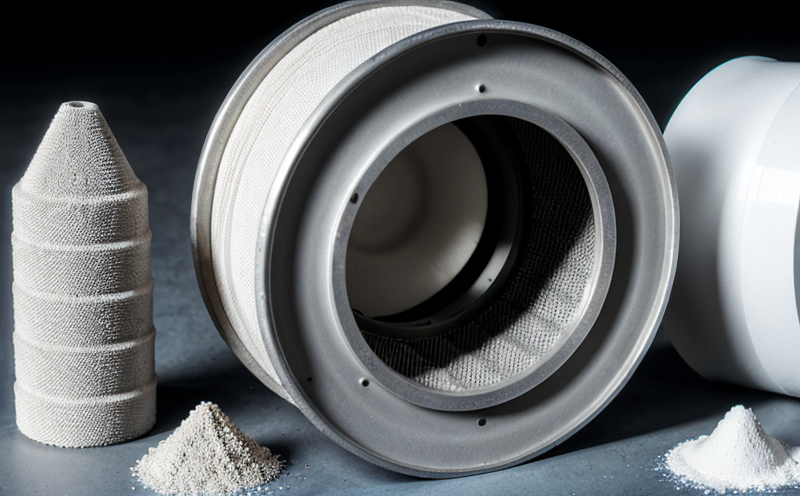IMO IGF Code Certification Testing of Gas-Fuelled Ship Systems
The International Maritime Organization (IMO) has introduced the International Guidelines for the Safe Use and Control of Ships’ Operational Pollution Prevention Equipment (IGF Code), aimed at enhancing safety, reducing environmental impact, and ensuring compliance with international regulations. Our laboratory specializes in providing comprehensive testing services to ensure that gas-fuelled ship systems meet the stringent requirements outlined in the IGF Code.
The IMO IGF Code is designed for the safe operation of ships using alternative fuels, particularly liquified natural gas (LNG) and other gases. Gas-fuelled ships are increasingly becoming a viable option due to their potential to reduce greenhouse gas emissions and other pollutants compared to traditional fuel oil. However, the use of these alternative fuels requires robust systems that can operate safely and efficiently under various conditions.
Our laboratory plays a crucial role in ensuring that all components and systems used in gas-fuelled ships are certified as safe and reliable. This includes testing materials, components, and entire systems to ensure they meet the highest standards of quality and safety. The testing process involves rigorous evaluation using state-of-the-art equipment and methodologies designed specifically for this purpose.
The first step in our certification process is thorough preparation of the specimens or systems that need to be tested. This includes cleaning, conditioning, and ensuring the integrity of the materials before they are subjected to various tests. Once prepared, we use a range of advanced testing instruments and techniques to evaluate the performance of these components under simulated real-world conditions.
The IGF Code specifies detailed requirements for gas-fuelled systems, including those related to fuel supply lines, engine room ventilation, fuel gas pressure regulation, and safety measures such as emergency shut-off valves. Our laboratory ensures that all aspects of these systems are thoroughly tested to meet or exceed the standards set by the code.
One of the key tests we perform is the evaluation of material compatibility with LNG and other gases used in ship engines. This involves testing how different materials interact under high-pressure conditions, ensuring they do not degrade over time. We also conduct tests on the durability and reliability of components such as fuel injectors, pressure regulators, and sensors.
In addition to physical performance tests, our laboratory conducts simulation-based assessments using computer models and real-time data analysis tools. These simulations help us predict how gas-fuelled systems will behave under various operational scenarios, ensuring they are safe for use in maritime environments.
The results of these tests are meticulously documented and reported according to international standards such as ISO 15682-1 & -2, which provide guidelines for the safe management of liquefied petroleum gas (LPG) fuel systems on board ships. Our reports include detailed descriptions of test procedures, outcomes, and recommendations for any necessary modifications or improvements.
Our laboratory’s expertise in marine equipment testing goes beyond just certification; it also involves providing valuable insights into potential areas for improvement based on our findings during the tests. By working closely with shipbuilders, manufacturers, and operators, we help ensure that gas-fuelled ships not only comply with current regulations but are also prepared for future changes.
Through our comprehensive testing services, we contribute significantly to enhancing safety and reducing environmental impact in the maritime industry. Our commitment to quality, accuracy, and reliability ensures that gas-fuelled ships can operate safely while minimizing their carbon footprint on the world’s oceans.
Why It Matters
The IMO IGF Code is essential for ensuring the safe operation of ships using alternative fuels like LNG. Compliance with these regulations not only helps protect human life at sea but also reduces environmental pollution from maritime sources. By adhering to the guidelines set forth by the IGF Code, operators can reduce their carbon emissions and contribute positively to global efforts towards sustainability.
Our laboratory’s role in this process is critical because it ensures that each component of a gas-fuelled system meets the required standards before being installed on board ships. This helps prevent potential failures or accidents that could lead to environmental disasters such as oil spills or air pollution incidents.
The importance of our work extends beyond individual ships; it impacts the entire maritime industry by promoting best practices in fuel management and safety measures. As more vessels adopt alternative fuels, there will be an increasing need for laboratories capable of providing accurate and reliable certification services like ours.
Environmental and Sustainability Contributions
- Emissions Reduction: By certifying gas-fuelled ship systems that comply with the IGF Code, we help reduce greenhouse gases and other pollutants emitted into the atmosphere. This contributes to global efforts aimed at combating climate change.
- Biodiversity Protection: Cleaner burning fuels like LNG have less impact on marine ecosystems compared to conventional bunker fuels. Our tests ensure ships are equipped with systems that minimize harm to aquatic life.
- Sustainable Resource Use: Properly certified fuel supply lines and pressure regulation systems help optimize the use of natural resources, ensuring they last longer without compromising performance.
- Reduced Noise Pollution: Safer operation of ships translates into quieter vessels, which can significantly reduce noise pollution in sensitive areas such as coastal regions and wildlife habitats.
Competitive Advantage and Market Impact
By offering IMO IGF Code certification testing services for gas-fuelled ship systems, our laboratory provides a unique value proposition that sets us apart from competitors. Shipowners and operators who partner with us gain access to expert knowledge and cutting-edge technology used in the industry.
Our reputation as a trusted provider of high-quality testing ensures confidence among clients when making decisions about their fleet’s equipment. This trust translates into increased business opportunities for our partners, as they can promote their compliance status proudly.
The demand for sustainable shipping solutions is growing rapidly, driven by increasing pressure from governments and stakeholders to reduce environmental impacts. Companies that demonstrate leadership in adopting cleaner technologies like LNG stand out favorably among consumers and investors alike. Partnering with a laboratory like ours demonstrates commitment to these values, thereby enhancing brand reputation.





